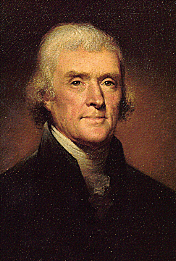| On
July 4 1776, our people declared freedom from England and King George III.
The fifty-six members of the second continental congress has been meeting
in Philadelphia, and voted on and passed the Declaration of Independence.
There were five members of Congress on the committee write the Declaration.
John Adams, Roger Sherman, Benjamin Franklin, Robert Livingston, and Thomas
Jefferson, the one who wrote the Declaration.
The Declaration has four main parts. The first part
is the Preamble, a sort of introduction. It tells the world why the Continental
Congress appointed Jefferson to write the document. In the Preamble he states:
When, in the course of human events, it becomes necessary for one people to
dissolve the political bonds which have connected them with another, and to
assume among the powers of the earth, the separate and equal station to which
the laws of nature and of nature's God entitle them, a decent respect to the
opinions of mankind requires that they should declare the causes which impel
them to the separation.
The second part is a statement on the natural rights of mankind. It discusses
the rights given to us by God and outlines the legitimacy of our revolution. Jefferson
drew heavily on the writings of fellow Englishman John Locke and a fellow
Virginian, George Mason, to tell the world what seems to be a revolutionary
idea, that...
all men are created equal, that they
are endowed by their Creator with certain unalienable rights, that among these
are life, liberty and the pursuit of happiness. That to secure these rights,
governments are instituted among men, deriving their just powers from the
consent of the governed.
The third part is a long list of grievances
that provides the rationale
for our rebellion.
Many of the offenses committed by King George III against the people of these
colonies are evident to the world as Mr. Jefferson has listed them, much in the
same way the crimes of James II were listed in our Parliament's Bill of Rights
in 1689.
The fourth and final part of the Declaration includes the formal
announcement of our independence. This document tells the world our view
on democratic rule, limited government, representative government, individual
liberties, rule by law, natural rights, and the social contract between the
government and the people. Congress wanted
to achieve a peaceful settlement with England, but with the advent of violence
and bloodshed, we must all move together toward the same fate: freedom
or tyranny!
New York Royal Statue
Death to Monarchy!
Celebrate American Independence!

|

 Thomas
Jefferson, He is the delegate of the second Continental Congress who wrote
the Declaration of Independence. This document was
appointed on the floor of Congress. It
was wholly the work of Thomas Jefferson, except
for minor changes by John Adams and Benjamin
Franklin and other delegates. Jefferson
was a graduate from the College of William
and Mary. He studied law under
George
Wythe. After that he was a leader in
the Colonial House of Burgesses from the year 1769 until the year 1775.
He was apart of forming and became a member of, the Virginia Committee
of Correspondence. In his paper A Summary View of the Rights of
British American prepared the First Virginia Convention. He brilliantly
expounded the view that England had no authority in the colonies and that
the only bond with England was that of voluntary allegiance to the king.
Jefferson now lives in Goochland, Va. He is a delegate to the Second Continental
Congress. Thomas
Jefferson, He is the delegate of the second Continental Congress who wrote
the Declaration of Independence. This document was
appointed on the floor of Congress. It
was wholly the work of Thomas Jefferson, except
for minor changes by John Adams and Benjamin
Franklin and other delegates. Jefferson
was a graduate from the College of William
and Mary. He studied law under
George
Wythe. After that he was a leader in
the Colonial House of Burgesses from the year 1769 until the year 1775.
He was apart of forming and became a member of, the Virginia Committee
of Correspondence. In his paper A Summary View of the Rights of
British American prepared the First Virginia Convention. He brilliantly
expounded the view that England had no authority in the colonies and that
the only bond with England was that of voluntary allegiance to the king.
Jefferson now lives in Goochland, Va. He is a delegate to the Second Continental
Congress.

Against Independence
I don't see why the colonies
need the declaration of Independence. Great Britain has total control
of the colonies and would do a far better job than any colonie could do.
King George has been good to thy family. Congress has no right to
declare the independence 0f the colonies. New York will never let
the Declaration pass. If ye are wise do and stop the war began in
1775 in Lexington and Concord. England hast the greatest navy and are the
best at fighting.
New Yorker, colonist
For Independence
The Declaration of Independence
is the best forth the colonies. Parliament is heavily taxing us.
By creating our own Republican form of government, we can carry out our
own affairs including taxation. Thus we willst declare independence
on England.
Marylander, colonist |
|


